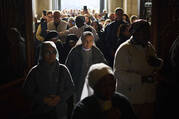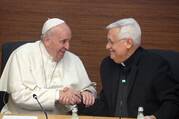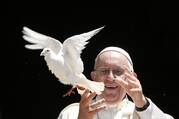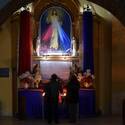Loading...
Click here if you don’t see subscription options
Click here if you don’t see subscription options

FaithVatican Dispatch
Cardinal Becciu issued a statement the morning of April 29 saying, “I have decided to obey—as I have always done—the will of Pope Francis not to enter the conclave, while remaining convinced of my innocence.”

FaithNews
Cardinal Pietro Parolin told some 200,000 people in St. Peter’s Square that Pope Francis had made the message of God’s limitless mercy the heart of his pontificate.

FaithVatican Dispatch
Cardinal Giovanni Battista Re’s homily for the funeral of Pope Francis.

FaithShort Take
Universities need to change. But Trump is attacking the wrong problems.

FaithFaith in Focus
I discovered that Catholicism could speak meaningfully to contemporary issues, that it could challenge power rather than embody it. I began to pay attention again.

FaithNews
So many mourners lined up to see Pope Francis lying in state in a simple wooden coffin inside St. Peter’s Basilica that the Vatican kept the doors open all night.

FaithNews
A church that dialogues is “much more interesting than a church where things fall from up high,” Jesuit Father Arturo Sosa, superior general of the Jesuits, said.

Politics & SocietyThe Weekly Dispatch
The pope’s attention to migration and climate change were well known, but the pope was also attentive to a number of other global issues and challenges like nuclear disarmament, tax justice, development, and the rise of autonomous (A.I.) weapons systems.

FaithPodcasts
On this week’s episode of “Jesuitical,” Ashley and Zac are joined by magazine’s editor in chief, Sam Sawyer, S.J., and America editor at large James Martin, S.J., to discuss “the people’s pope.”
The WordSecond Sunday of Easter (Year C)
“Jesus said to them again, ‘Peace be with you. As the Father has sent me, so I send you’” (Jn 20:21).

